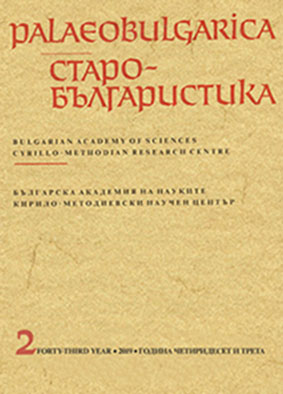Съвременните кирило-методиевски изследвания в Европа – посоки, резултати, перспективи
Contemporary Cyrillo-Methodian Studies in Europe – Directions, Results, Perspectives
Author(s): Svetlina NikolovaSubject(s): Language studies, Language and Literature Studies
Published by: Кирило-Методиевски научен център при Българска академия на науките
Keywords: Acta Sanctorum; Cyrillo-Methodian bibliography; Cyrillo-Methodian sources; Cyrillo-Methodian studies; national identity; syncretic method; textological research
Summary/Abstract: The text presents a plenary report read at the 16th International Congress of Slavists on the 20th of August 2018 in Belgrade. It traces out the directions, the results and the perspectives of contemporary Cyrillo-Methodian studies, which are largely defined by their development since the beginning of research on the topic in the second half of the 17th c. until the middle of the 20th c. Special attention is paid to the characteristic features of the results from the exploration of the Latin sources about the work of Cyril and Methodius in the sources available then and to the general conclusions published in volume III of the Acta Sanctorum series published by the Bollandist Society in 1668. This was the first publication on the work of Cyril and Methodius to define the basic characteristics of the modern scholarly approach and to use a syncretic method combining elements from different fields of the humanities. This approach to exploring Cyrillo-Methodian problems was adopted and perfected during the next period of development of the research on the life and work of the Slavonic enlighteners and the Cyrillo-Methodian traditions in Europe, a period that continued until the first decades of the 19th c. During this stage of extensive development no change in the research methods was observed. The period was marked by an expansion of the documentary basis of Cyrillo-Methodian studies (the Byzantine sources were discovered); for the first time some specific problems of the Slavonic alphabets were considered (e.g. the question of the relations of Cyrillo-Methodian work to the Glagolitic alphabet and the Slavonic languages), more scholars, including some of Slavic origin, joined the research process. During the next stage, which continued until the middle of the 20th c., the studies gained a pan-European dimension. Against the background of Slavic Philology, which had formed back in the 19th c., and the differentiation of separate scholarly disciplines treating Cyrillo-Methodian issues (archeography, codicology, textology, linguistics, church, political, cultural and literature history, theology, art history, biblical studies) several specific features of studies emerged: a trend toward fragmentation of topics, an intensive development of linguistic research, which was the last to attract the researchers’ attention, the focusing of research on the Slavonic sources (another late discovery of the scholars), the first signs of connecting the work of the Slavonic enlighteners with the growing number of Slavonic peoples which were developing Cyrillo-Methodian traditions, and their relation to national identity. During the second half of the 20th c. the process of the fragmentation of research according to the specific subject of analysis and the methods of the respective scientific discipline was already completed. Moreover, relatively well-formed groups of researchers specialized in implementing their research in different scholarly fields that already existed. This way of work is typical of almost all contemporary research. Therefore, Cyrillo-Methodian studies move away from one another quickly and continuously, depending on the subject and research methods, and are most often completely independent since the problems are stated and solved within the framework of one scientific discipline only. One of the characteristic features of Cyrillo-Methodian studies of the second half of the 20th c. is their vigorous growth in Europe after 1958. This was a period of increased research interest in the connection of the work of Cyril and Methodius and the national identity of some Slavic countries, of a linguistic and textological research boom. The paper gives several examples of important contributions from scholars from various European countries in the field of research on Cyrillo-Methodian sources, a field that was considered to be exhausted. The author stresses that new discoveries can be expected even in allegedly exhausted fields, that many questions are still unsolved or controversial, and that during the last years there has been a visible slow-down of research in all European countries. Finally, the paper outlines the perspectives for the future development of Cyrillo-Methodian research in Europe and the possibilities for its implementation in several directions, which have shown sustainable development in the past years and have great potential for new achievements in the future: the study of Cyrillo-Methodian sources, the textological research which needs to keep abreast with the latest methods of textual criticism developed in Europe and the US, and the preparation of a complete Cyrillo-Methodian bibliography. Special emphasis is put on the need for preparing a new generation of researchers to work with Cyrillo-Methodian sources and traditions.
Journal: PALAEOBULGARICA / СТАРОБЪЛГАРИСТИКА
- Issue Year: 2019
- Issue No: 2
- Page Range: 3-18
- Page Count: 16
- Language: Bulgarian
- Content File-PDF

